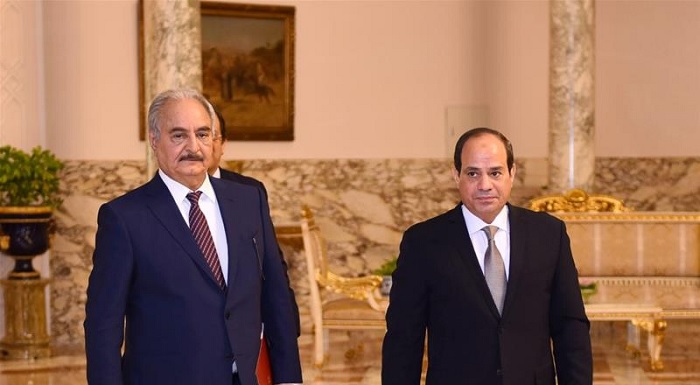
Announcement comes as Arab League ministers hold an emergency meeting to find ‘a pause’ in intensified fighting.
Libya’s internationally recognised government says plans were discussed with the head of US Africa Command (AFRICOM) to jointly “fight terrorism” in the war-torn country during a meeting with Prime Minister Fayez al-Sarraj.
The Libyan-American discussions were held as foreign ministers from the Arab League on Tuesday were to hold an emergency meeting to try and find a diplomatic solution in Libya amid increasing foreign intervention and heightened fighting.
“Under the framework of consultations on the evolution of the situation in Libya, Fayez al-Sarraj on Monday met with [American] General Stephen Townsend and the US Ambassador to Libya Richard Norland,” the Government of National Accord (GNA) said in a statement.
The two US officials arrived at Zuwara Airport, about 120km (100 miles) west of the capital Tripoli for the meeting.
They held talks on “joint coordination between the GNA and AFRICOM for the fight against terrorism in the framework of the strategic cooperation between Tripoli and Washington”, the GNA said.
‘Strategic pause’
Libya has been torn apart by violence drawing in tribal militias and foreign actors since the 2011 toppling and killing of longtime dictator Muammar Gaddafi in a Western-backed uprising.
The oil-rich country is split between rival administrations in the east and west, with the conflict recently attracting increasing foreign involvement.
“In the context of escalating foreign intervention in Libya, the meeting focused on current opportunities for a strategic pause in military operations by all parties to the conflict,” the US Embassy in Tripoli said in a statement.
“Ambassador Norland outlined US support for the diplomacy under way through UN auspices to promote a ceasefire and political dialogue.”
Tensions are rising in Libya with the GNA enjoying Turkish military support in its conflict against renegade commander Khalifa Haftar and his Libyan National Army (LNA).
Norland said “external actors should stop fuelling the conflict [and] respect the UN arms embargo” with a view to preserving Libyan sovereignty and fostering political stability.
The US-GNA talks came days after AFRICOM said it had proof of Russian military planes active in Libyan airspace using airbases at Jufra and the key city of Sirte east of the capital.
“The last thing that Libya needs right now is more fighting, more military mobilisation, more transfer of weapons, more presence of either foreign fighters or mercenaries,” Stephane Dujarric, spokesman for the UN secretary general, told Al Jazeera.
France sides with Egypt
France is also suspected by analysts of backing Haftar alongside Egypt, Russia, and the United Arab Emirates, but Paris insists it is neutral in the conflict.
Turkey’s intervention on behalf of the GNA has turned the tide against the LNA and its 14-month campaign to capture Tripoli, with Haftar’s forces retreating eastwards.
In a sign of convergence between France and Egypt, French President Emmanuel Macron said on Monday he could understand the “legitimate concern” of Egyptian President Abdel Fattah el-Sisi, who has warned advances by Turkey-backed GNA forces could prompt a military intervention by Cairo.
Macron also accused Turkey of playing “a dangerous game” in Libya.
“I don’t want in six months, or one year or two, to see that Libya is in the situation that Syria is in today,” said Macron, who earlier accused fellow NATO member Turkey of playing a “dangerous game” in Libya.
Meanwhile, Turkey hit back at French criticism of its intervention in Libya, saying Macron must have suffered an “eclipse of the mind” to oppose Ankara’s support for the internationally recognised Tripoli government.
“The current troubles in Libya are caused by the attacks of putschist Haftar, whom (Macron) supports and who is a warlord who refused ceasefire accords in Moscow and Berlin,” he said, referring to international efforts to end the fighting in January.
Doomed dialogue?
It remains to be seen whether Tuesday’s Arab League meeting can produce any meaningful results on the ground in Libya.
Al Jazeera’s Mahmoud Abdelwahed, reporting from Tripoli, said the GNA’s foreign ministry rejected the Egyptian call for dialogue and highlighted the military and diplomatic support Cairo has provided Haftar over the past five years.
“The government in Tripoli says it cannot trust any offer from the Egyptian regime, especially after the threat made by the Egyptian president, which the GNA considers a violation of its sovereignty and a severe intervention into Libya’s domestic affairs,” Abdelwahed said.
“The government says any conclusions from this gathering will be void because it [Egypt] failed to consult it on the session.”
